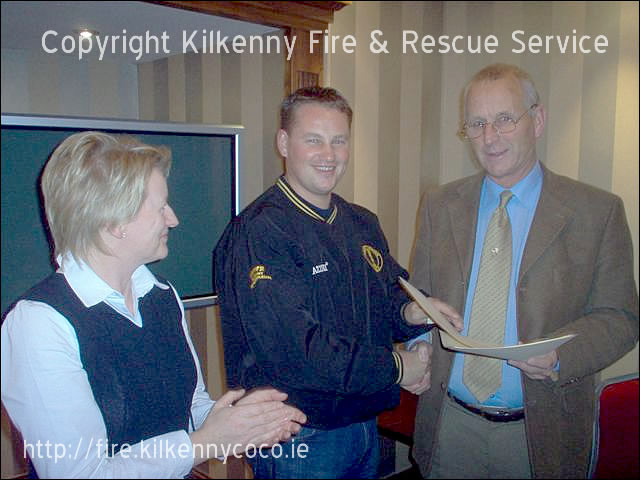Critical Incident Stress, December 2004

William Walsh of Freshford Fire & Rescue Service
In recent years there has been increased awareness on the impact of Critical Incident Stress (CIS) such as Road Traffic Incidents (RTI's) on the well being of Fire Fighters. It is now recognised that repeated exposure to such incidents, or exposure to a major traumatic incident can lead to serious impairment in personal, social and occupational functioning and can cause Post Traumatic Stress Disorder (PTSD).
It was against this background that Brendan McCoy Acting Chairman of the National Retained Fire Fighters Association (NRFA) in conjunction with Matt Merrigan of SIPTU organised a two day training course on "Stress Prevention in the Fire Service" and "Post Incident Support for Fire-Fighters". This course took place in the Prince of Wales Hotel, Athlone on Wednesday and Thursday 1st & 2nd December 2004 under the guidance of Maurice Quinlan, Director, EAP Institute and Patricia McParland of the Northern Ireland Fire Service.
The following delegates attended the course:-
Chris Cleary Trim, Philip Cooper Drogheda, Billy Horrigan Portumna, Philip Bishop Ballaghadereen, Cathal Murphy Bandon, Billy O'Connor Castleisland, Ciaran Ryan Sligo, Gerry Walsh Bray, William Walsh Kilkenny, John McGuire Ballyshannon.
The first day of the course focused on the legal obligations and duty of care of the Fire Service to protect Fire Fighters from all psychological hazards including CIS. Preventative steps were outlined which included hazard identification, risk assessment and control measures, which should be reflected in a safety statement for the Fire Service. One of the surprising issues raised by the delegates was that of bullying with seven out of ten reporting that bullying cases were pending in their areas. On the afternoon of day two Patricia McParland of the Northern Ireland Fire Service outlined methods of overcoming resistance to support and the development of first steps in basic counselling skills which could be utilised.
The focus of day two was on the development of a Critical Incident Stress Management (CISM) plan which should form part of the safety statement and detail the response after incidents. This should include a protocol for Critical Incident Stress Debriefing (CISD) developed specifically for the Fire Service. Delegates were also advised that their should be provision for peer support, trauma counselling and assessment for PTSD if required. Medical assistance should also be available.
The course concluded with delegates outlining actions that they would take on return to their areas. The main assignments included:- checking the safety statement to see if is was up-to-date, examining existing counselling arrangements and providing peer support to colleagues who request assistance on a confidential basis.
Overall this course was highly evaluated by the delegates and follow-up is planned with the ten delegates on the 31st march 2005 to evaluate the outcome of the assignments. Future plans by NRFA include the development of peer support guidelines, further information on the web site and future training including the bi-annual conference and another course for Fire fighters in 2005.
Presentation of Certificates from the recent 2-day course in Athlone on Stress Management & Fusion for Retained Firefighters
For further information contact:
Maurice Quinlan, EAP Institute, 143 Barrack St. Waterford Ireland

 Kilkenny County Council
Kilkenny County Council
